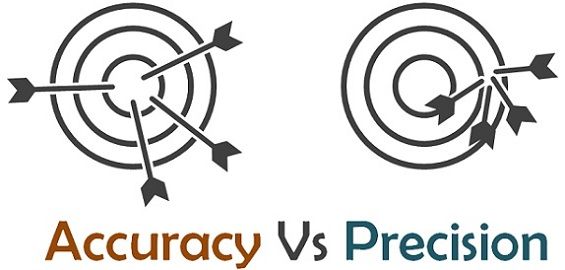 To a layperson accuracy and precision are synonyms, but to a person involved in measurement, these two convey different meanings. While accuracy is ‘the state of being correct’, precision is ‘the state of being exact’, people commonly misconstrue the two terms.
To a layperson accuracy and precision are synonyms, but to a person involved in measurement, these two convey different meanings. While accuracy is ‘the state of being correct’, precision is ‘the state of being exact’, people commonly misconstrue the two terms.
Accuracy symbolizes the extent of conformity, whereas Precision indicates the extent of reproducibility.
At the time of taking measurements, these two are always taken into account, due to their utmost importance in the various field, such as science, statistics, research and engineering. So, let’s take a glance at the difference between accuracy and precision.
Content: Accuracy Vs Precision
Comparison Chart
| Basis for Comparison | Accuracy | Precision |
|---|---|---|
| Meaning | Accuracy refers to the level of agreement between the actual measurement and the absolute measurement. | Precision implies the level of variation that lies in the values of several measurements of the same factor. |
| Represents | How closely result agree with the standard value? | How closely the results agree with one another? |
| Degree | Degree of conformity | Degree of reproducibility |
| Factor | Single factor | Multiple factors |
| Measure of | Statistical bias | Statistical variability |
| Concerned with | Systematic Error | Random Error |
Definition of Accuracy
By the term ‘accuracy’, we mean the degree of compliance with the standard measurement, i.e. to which extent the actual measurement is close to the standard one, i.e. bulls-eye. It measures the correctness and closeness of the result at the same time by comparing it to the absolute value.
Therefore, the closer the measurement, the higher is the level of accuracy. It mainly depends on the way; data is collected.
Definition of Precision
Precision represents the uniformity or repeatability in the measurements. It is the degree of excellence, in the performance of an operation or the techniques used to obtain the results. It measures the extent to which the results are close to each other, i.e. when the measurements are clustered together.
Therefore, the higher the level of precision the less is the variation between measurements. For instance: Precision is when the same spot is hit, again and again, which is not necessarily the correct spot.
Key Differences Between Accuracy and Precision
The difference between accuracy and precision can be drawn clearly on the following grounds:
- The level of agreement between the actual measurement and the absolute measurement is called accuracy. The level of variation that lies in the values of several measurements of the same factor is called as precision
- Accuracy represents the nearness of the measurement with the actual measurement. On the other hand, precision shows the nearness of an individual measurement with those of the others.
- Accuracy is the degree if conformity, i.e. the extent to which measurement is correct when compared to the absolute value. On the other hand, precision is the degree of reproducibility, which explains the consistency of the measurements.
- Accuracy is based on a single factor, whereas precision is based on more than one factor.
- Accuracy is a measure of statistical bias while precision is the measure of statistical variability.
- Accuracy focuses on systematic errors, i.e. the errors caused by the problem in the instrument. As against this, precision is concerned with random error, which occurs periodically with no recognisable pattern.
Conclusion
So, if the actual measurement is high in accuracy and precision, the result would be free from errors. If the actual measurement is precise but inaccurate, then the result is in disagreement with the expected one. If the actual result is accurate but imprecise, then there are huge variations in the measurements. And finally, if the actual measurement is neither accurate nor precise, then the result would lack correctness and exactness at the same time.






Ayesha says
Excellent explanation, I would never understand the difference in such a clear and easy way. Today my concepts are crystal clear about this difference. Thanks
Big D says
If you were my physical sciences educator back in high school, I wouldn’t be here now